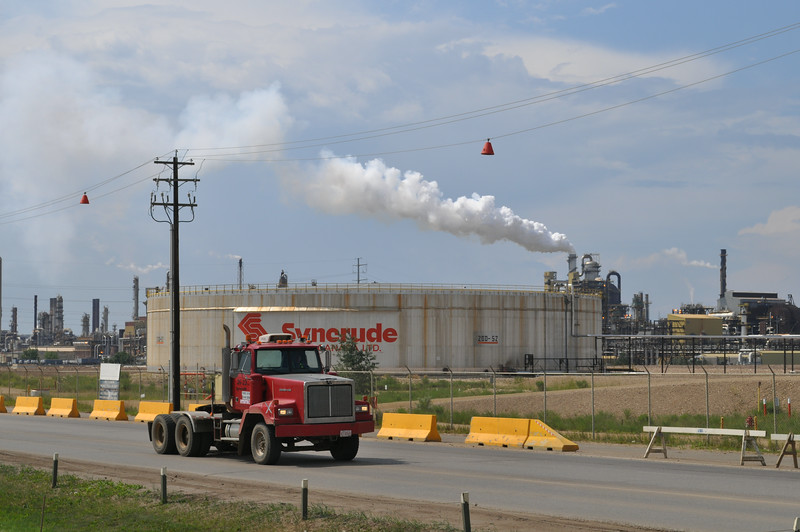 In late June, a team of RAN staff travelled to Fort McMurray in Alberta, Canada to participate in the Tar Sands Healing Walk, which is organized and hosted by members of the local First Nations Communities. Walking amidst the tar sands destruction was a humbling and powerful experience.
In late June, a team of RAN staff travelled to Fort McMurray in Alberta, Canada to participate in the Tar Sands Healing Walk, which is organized and hosted by members of the local First Nations Communities. Walking amidst the tar sands destruction was a humbling and powerful experience.
This blog post is one of a series, sharing our impressions and reflections.
The tar sands developers try to camouflage their industry, so you don’t know it’s a part of a greater system of oppression. From the main roads around the tar sands industry only thick forests and an immense turquoise sky are visible. These lands are valuable to the First Nations people including the Athabasca Chipewyan First Nation, the Beaver Lake Cree, and the Mikisew Cree, who have always lived in the vicinity and whose health and livelihood in many ways depend on the land. Unfortunately, these lands are also valuable to the oil industry, because the tar sands underneath contain bitumen, an extremely dirty form of petroleum.
From within the industrialized area, where companies extract tar sands oil, the scene is very different. By the oil extraction sites there are no trees. In a land that should be forest everything is barren—a man-made desert of depleted sand. There are no birds. There are no living creatures. There are “tailings ponds”, industrial waste sites that are filled with mercury, lead and arsenic. The water is actually toxic to drink. The air is toxic to breathe. Still to the human eye, the calamity of the situation is left uncertain. You can see this one instance of environmental destruction, but you can’t see the system of oppression that enables it. The oil industry hides behind the camouflage of economic “development” and “reclamation.” The oil industry allies with the government. It allies with investors who gain monetary benefits from its development. It allies with an international system that approves of destroying land for oil. All those allies are people who fail to see oppression for what it is, and want to uphold it.
With increasing frequency I hear people pointing at climate change and environmental destruction as the cause of human rights violations. The development of the tar sands in Canada is no exception. The Alberta tar sands are the largest industrial project in the world, and one of the most controversial. Their development has been linked to extremely high rates of fatal cancers, displacement, and loss of traditional ways of life for the many First Nations that live in the vicinity. After participating in the Tar Sands Healing Walk I cannot help but ask: if we learn the history of colonization of the First Nations people, wouldn’t we better understand the tar sands? If we looked at the environmental destruction of the tar sands as a symptom of colonization, our understanding of the struggle against such destruction would change.
Colonization has dictated who has rights to land, air, water and even traditional culture for most of modern history. For example, here in California water rights were historically “first in time, first in law.” This granted water rights to the first settler to claim a water source, completely ignoring the actual first people of the land. “Common law was founded on a racist precedent,” said Derek Nepinak, Grand Chief of the Assembly of Manitoba at his keynote address the night before the healing walk. Just like water rights in California, the development of the tar sands is based on a racist common law. The tar sands belonged to the First Nations people, but Canada has in many ways betrayed the rights of the people in favor of the oil industry. Historically, colonization was often fatal for those who had to suffer it in their daily lives. This is still true for the First Nations people who live by the tar sands. Worst of all, its fatality is part of the intent.
We can stop the destruction of the tar sands by taking action. For example, we can protest the many pipelines being built, that will carry the tar sands oil and further enrich the industry. However, stopping the tar sands does not prevent this same oppression from happening somewhere else. Without an end to colonization once and for all, even ending the development of the tar sands may not be enough. We need to not only stop the current threats, but leave no room for such injustices to continue.
Fighting oppression is no little feat. But perhaps one step is looking deeper at ourselves, especially those of us who are settlers in North America. We should understand the real history of the tar sands and its relationship to colonization, and no longer let the oil industry make a fool of us with its camouflage and illusions.
I have seen the effects of colonization left behind on my family’s ancestral lands, but seeing it so alive and well during the Tar Sands Healing Walk was a shock to my system. Unfortunately it’s not a shock for those who experience it on a daily basis. One of the most powerful messages came from Frank Waln, a musician from the Rosebud Reservation in South Dakota. In the chorus of his song “Oil for Blood” he sang of the effect the Keystone Pipeline, which would carry tar sands oil from Canada to the Texas Gulf Coast, would have if built:
Oil for blood
Oil for blood
Making you rich, you soil my love
Oil for blood
Oil for blood
My mother is clean, that oil is mud(Keystone) Everything’s RED
(Pipeline) Now everything’s dead